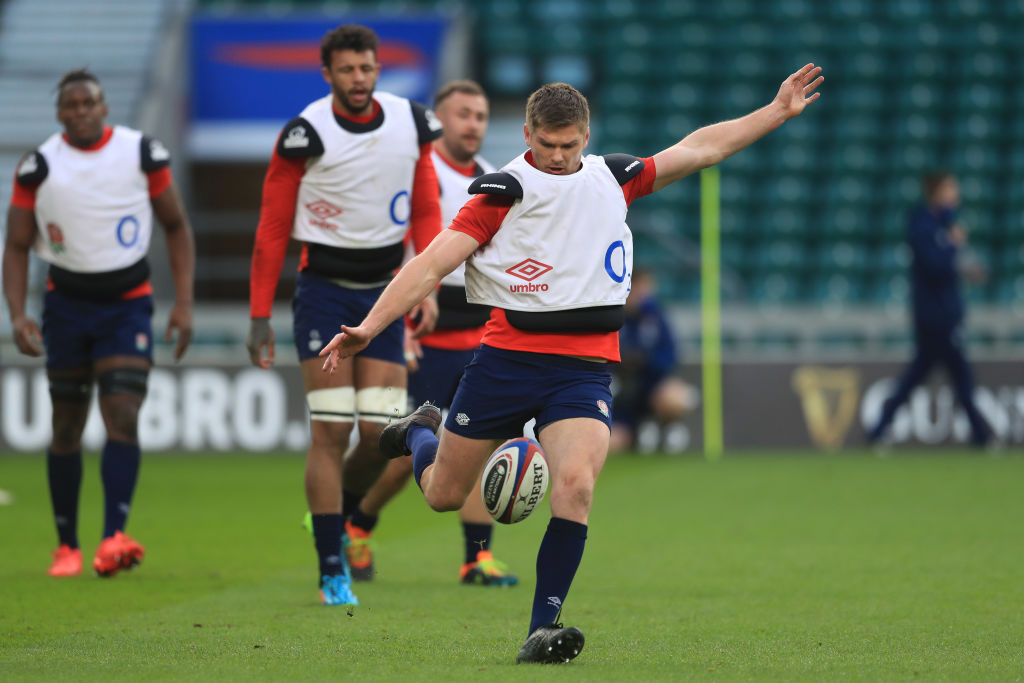England captain Farrell banned for Argentina and Japan matches at World Cup

LONDON, ENGLAND - FEBRUARY 20: Owen Farrell of England kicks during an England rugby training session ahead of their Six Nations match against Wales at Twickenham Stadium on February 20, 2021 in London, England. (Photo by Adam Davy - Pool/Getty Images)
Owen Farrell will miss England‘s first two World Cup games after a World Rugby appeal successfully overturned the Independent Judicial Committee (IJC) ruling that saw his red card against Wales downgraded to a yellow.
But despite receiving a four-match suspension Farrell will be available following England’s final warm-up against Fiji this Saturday and the Argentina and Japan matches in the World Cup, with his non-selection in last Saturday’s defeat against Ireland counting towards the ban.
Although Farrell denied guilt last week, and this helped in the initial decision to give him a red card being quashed, “the player’s acceptance of foul play, clear demonstration of remorse and his good character,” resulted in the entry level ban of six weeks being reduced to four according to a statement on the RFU website.
The decision ends ten days of speculation following the tackle that Farrell made on Taine Basham in England’s narrow victory against Wales in their second warm-up game.
There was little debate about the decision at the time, but the RFU initially managed to overturn the decision in the initial disciplinary hearing, which found that Jamie George had pushed Taine Basham into the path of Farrell’s shoulder, and therefore Farrell should never have received a red card in the first instance.
But World Rugby had already prepared an appeal to the decision prior to the IJC ruling going public, as the decision went against their key priority of player welfare.
The crucial element to this decision having a different verdict to the previous one came down to the fact that the tackle, whether there was any mitigation to the point of contact or not, was ‘always illegal’ as Farrell made no attempt to wrap his arms.
The statement continued: “The failure to attempt to wrap was judged to be an important element of the Foul Play Review Officer’s (FPRO) report and had led to an upgrading of the referee’s yellow card to a red card during the match.
“As this element did not feature in the original decision, the Appeal Committee decided it was in the interests of justice to hear the case afresh on that key point alone, which included hearing from the player.
“Following the review by the Appeal Committee of this key element, it was determined that the FPRO was correct in his decision leading to the red card. The Appeal Committee subsequently determined that the tackle was ‘always illegal’.
“When applying the terms of World Rugby’s Head Contact Process, no mitigation can be applied to a tackle that is ‘always illegal’.
“The Appeal Committee therefore considered that the Disciplinary Committee’s decision to downgrade the red card to a yellow card had been manifestly wrong, which led to the Disciplinary Committee’s decision being overturned, the appeal brought by World Rugby being allowed, and the red card upheld.”
The four-match ban means that George Ford, integral in England’s win against Argentina at the 2019 Rugby World Cup, will be likely to have the reins at fly-half once again as the pair meet again at this year’s showpiece.
That will be followed by a game against Japan and this weekend’s game against Fiji, where Ford will also be likely to don the ten shirt, may be an interesting indicator of how successful England’s game plan will be against another team that looks to attack from range.
For exclusive stories and all the detailed rugby news you need, subscribe to The Rugby Paper website, digital edition, or newspaper from as little as 14p a day.